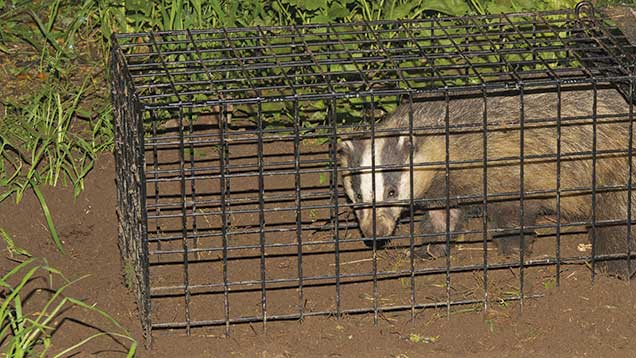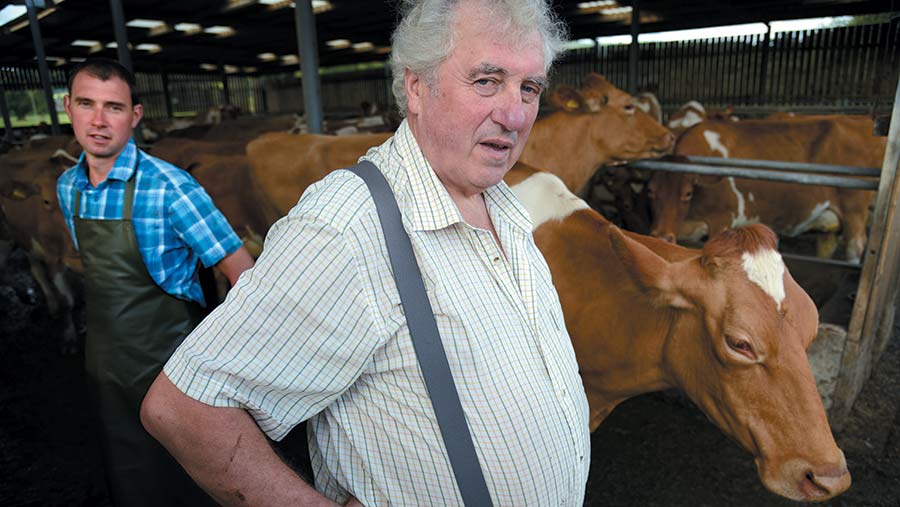BBC accused of ‘institutional bias’ in portrayal of badgers
 © Rex Shutterstock
© Rex Shutterstock The Badger Trust has written to the BBC to complain about the portrayal of badgers in its Land of Hope and Glory series.
Dominic Dyer, CEO of the Badger Trust, claims the corporation is “guilty of demonisation of badgers” and the series “could lead to more persecution of the species”.
In a letter sent to BBC director general Lord Hall, Mr Dyer requests an urgent meeting to discuss a “lack of balance and failure to properly investigate facts involving roles of badgers in cattle TB”.
See also: Culled badgers in Defra pilot could be tested for TB
The first episode of the three-part series was televised on BBC 2 last Friday (4 March).
It featured the heartbreaking story of Somerset dairy farmer Maurice Durbin, who said he would like to kick “bloody badgers” for infecting his cattle with TB, as two more of his prize-winning Guernsey cattle were sent to the abattoir.

Maurice Durbin © Jimmy Edmonds
Mr Durbin, 71, has been battling bovine TB at Bickfield Farm, in Compton Martin, Bristol, since 2010, where he has lost one-third of his 320-head Guernsey pedigree herd to the disease.
His views struck a cord with hundreds of farmers across the country, who believe a national cull of badgers, a protected species, will help curb this devastating disease, which led to the slaughter of more than 32,000 cattle in this country last year.
But the Badger Trust claimed the BBC programme failed to treat the issue with accuracy and impartiality.
Mr Dyer said: “A key concern for the Badger Trust is the demonisation of badgers to justify the continuation of the highly controversial badger cull policy and we regularly call on the farming industry, politicians and the media to be extremely cautious in the language they use to discuss badgers and bovine TB.
“The BBC failed to show sufficient caution in this area when producing Hope and Glory. On a number of occasions in the programme a clearly distressed and emotional Maurice Durbin appeared to be encouraged to make angry remarks about badgers and those who seek to protect them.”
‘Bloody badgers’
“In one scene the camera zooms in on Mr Durbin after one of his cattle has tested positive for TB, for him to say ‘bloody badgers’. In another part of the programme Mr Durbin talks of ‘do-gooders telling farmers what to do’ and how he is placing himself at personal risk by talking of the need to kill badgers.”
Mr Dyer added that the tension was further increased by the editor of Country Life, Mark Hedges, talking of farmers committing suicide as a result of bovine TB, which in his view had been made worse by political indecision over the need to kill badgers.
The Badger Trust branded such comments as “incendiary” and accused the BBC of “giving encouragement to farmers and landowners to take the law into their own hands and illegally kill badgers”.
It said: “The Badger Trust feels the BBC is not only being irresponsible in its duty to the public, but is also showing all the hallmarks of institutional bias.”
This is not the first time the Badger Trust has written to the BBC to complain about its coverage of badgers.
In July 2014, the trust complained after Countryfile reporter Tom Heap interviewed Princess Anne, who expressed the view that badgers should be gassed to help tackle TB.
The BBC has been asked to comment on the latest Badger Trust complaint, but has so far not released any statement.
Defra secretary Liz Truss has pledged to extend the government’s badger cull to more areas where TB is rife as part of the government’s 25-year plan to eradicate TB in this country.
‘TB poses huge threat to cattle industry’
A Defra spokeswoman said: “Our comprehensive strategy to eradicate bovine TB through tighter cattle controls, improved biosecurity and badger control is delivering results and we are on track to deliver TB freedom to more than half of the country by the end of this parliament.
“TB poses a huge threat to our farming industry and has cost £500m over the past decade. However, badger control in the South West has been successful and we are enabling it to take place over a wider number of areas.”
